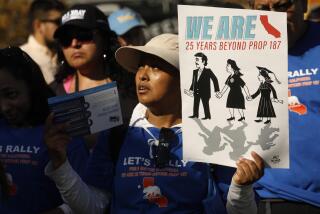Edwards’ Rhetoric Has Roots in Another Time and Another Place
- Share via
If you haven’t heard it yet in this political season, you will: John Edwards’ stump theme, the two Americas. “Today, under George W. Bush, there are two Americas, not one,” intones the North Carolina senator. “One America that does the work, another America that reaps the reward. One America that pays the taxes, another America that gets the tax breaks.”
With its roots in his personal journey of conquering poverty to become a multimillionaire senator, the Edwards speech might seem just a familiar rendition of the American dream. But to a British historian such as myself, this Democratic credo appears instead to owe its origins to the political philosophy of one of England’s great 19th century prime ministers -- Benjamin Disraeli.
Disraeli made political opportunity out of the terrible inequities created by the Industrial Revolution. In the early 1800s, Britain transformed from a rural, agricultural nation into the first modern urban society. The wealth from coal mines, cotton mills and ironworks built elegant streetscapes, Venetian-styled town halls and dynasties in the Victorian era’s celebrated cities: Manchester, Birmingham, Glasgow and Liverpool.
The cost of progress, however, was the creation of an impoverished working class. In place of pre-industrial Britain’s finely graded social system, there now lurked an urban proletariat bypassed by prosperity.
The visiting German socialist Friedrich Engels was shocked at how the “money aristocracy” took routes in and out of Manchester that avoided “the grimy misery that lurks to the right and the left.” He had never seen “so tender a concealment of everything which might affront the eye and the nerves of the bourgeoisie.” Other critics commented on how the Manchester middle classes felt “more interested in the condition of New Zealand” than the city slums.
In 1845, Disraeli, then an out-of-favor Conservative member of Parliament with a romantic attachment to pre-industrial harmony, blamed the class divide on the laissez-faire economics of the day and the lack of social responsibility among the political elite.
As a Victorian man of letters, Disraeli developed his critique in a bestselling book -- not the hackneyed “narratives” of today’s candidates but a sophisticated novel. “Sybil, or The Two Nations” was a story of class divide (and amorous melodrama) set amid the industrial strife and divisive riches of 1840s Britain. At the novel’s core was Disraeli’s polemic against the existence of two classes, two nations within one country -- “Between whom there is no intercourse and no sympathy; who are as ignorant of each other’s habits, thoughts and feelings as if they were dwellers in different zones, or inhabitants of different planets.” These two nations were “formed by different breeding, fed by different food, and are not governed by the same laws.” They were “the rich and the poor.”
“Sybil” struck a chord, and from Disraeli’s writings grew the “One Nation” tradition of British conservatism: a belief that wealth creation must be tempered by policies of social paternalism. It proved a highly successful manifesto, propelling the Conservative Party into office after decades in the political wilderness. On into the 20th century, Winston Churchill was happy to align himself with the One Nation faction, but Margaret Thatcher would have none of it. Thatcherism signaled an unapologetic revival of free-market ideology and an impatience with do-gooding state intervention.
But now Edwards has revived the rhetoric. In the Edwards update, the North American Free Trade Agreement and globalization have replaced industrialization; the struggling middle class has taken the place of the poor working class; and it is the American suburb, not the Victorian inner city, that plays home to this downtrodden tribe.
But what has remained is the urgency, the sense of injustice and the anger at the side-by-side existence of these disparate classes. “We cannot go on as two nations,” Edwards says, “one favored, the other forgotten. It is wrong to reward those who don’t have to work at the expense of those who do.”
True, there is also a strong flavor of Anglo-American radicalism about Edwards. His attacks on the corrupt nexus of Halliburton, Enron and the Bush White House could come straight from the pen of Thomas Paine or William Cobbett. When the senator points his finger at a Washington back-slapping elite -- with their corporate tax breaks, million-dollar pension funds and industrial outsourcing -- he is drawing on that successful strand of Atlanticist populism. But it is Disraeli who is Edwards’ true intellectual godfather. Which should put Democrats in good cheer. For although Republicans have criticized the vice presidential candidate for focusing on class divides, being too negative and repeating failed Al Gore slogans, they might note that the same message put Disraeli into No. 10 Downing Street.
Tristram Hunt is the author of “Building Jerusalem: The Rise and Fall of the Victorian City” (Weidenfeld & Nicholson, 2004) and will be teaching at Arizona State University in the fall.
More to Read
Sign up for our Book Club newsletter
Get the latest news, events and more from the Los Angeles Times Book Club, and help us get L.A. reading and talking.
You may occasionally receive promotional content from the Los Angeles Times.










